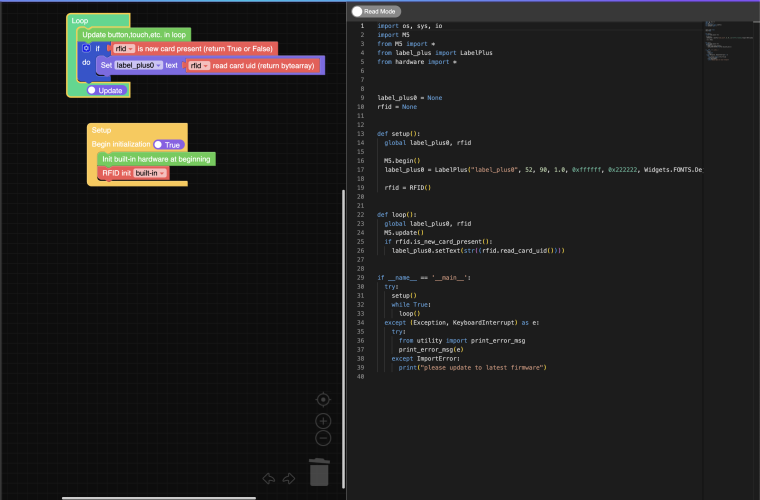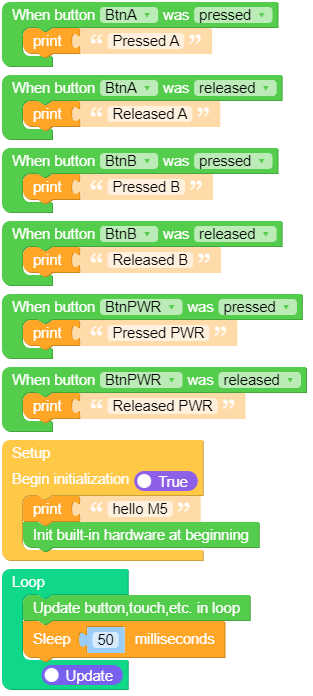UiFlow 2.0 discuss(how-to, bug, feature request or sometings)
-
@iamliubo Why only DAC hat is available with m5staick? No more hats?
-
@kris said in UiFlow 2.0 discuss(how-to, bug, feature request or sometings):
@iamliubo Why only DAC hat is available with m5staick? No more hats?
Because it take time to write and develop the code so that it doesn’t cause breakers in other code
-
Hi. I'm missing the 4-Relay Unit in the list of possible devices. Can you please add that back, as it exists in uiflow 1?
-
Hello @zendes
maybe my example (PlayZone: M5Dial_4RelayUnit_UIFlow2.0.1) can help out until the native 4-relay unit gets added in UIFlow2.
Note: you might need to modify the I2C pins for SCL and SCK dependent on the core you are using.
Thanks
Felix -
Just got my Dials in, demo was neat. Used the burner to flash UIFlow 2.0.3 (only option it gives is that or alpha29) (Note, i'm not new to M5Stack or UIFlow)... built a quick for testing the RFID reader which was reported to work... using blocks (and verifying the python)... it does not.. (not in 2.0.3 apparently):


-
I have a problem with the NCIR-2 temp sensor not being available in the Unit selection window of UIFlow2. I decided to switch to the NCIR hat and forego the high temp alert capability of the NCIR-2 and low and behold, the hat was missing from the add hat section too.
These are current products for sale in the M5 store. Wasn't the NCIR-2 introduced over two years ago? I think there would have been ample time to integrate them into the latest UIFlow. -
Hello @wmatkins
re: NCIR hat : I think it should work by adding the NCIR unit but with a custom I2C setting, e.g. SCL=26 and SDA=0.
Note: I do not have the NCIR hat or unit so I cannot test this myself.
Thanks
Felix -
Hello @sorphin
I can confirm that in M5Dial UIFlow2.0.3 firmware the blocks for the built-in RFID reader are not working and throw an error. However, as a workaround, I used the blocks of a virtual RFID unit (and modified I2C SCL and SDA pins) to successfully read RFID cards with the internal RFID reader. See PlayZone M5Dial_RFID_UIFlow2.0.3 example.
Thanks
Felix -
@felmue Thanks for confirming as well Felix. I did find that I could make it work in a round about way as well (using rfid.RFID (no parenthesis)).. but one shouldn't have to do that :/
-
I am programming using UiFlow 2.0 on my M5Stack Stick C Plus 2.
I have 3 issues currently:
-
1
When I burn UiFlow 2.0 using M5Burner, the tool shows esptool being used, which reports the file size being ~20KB.
This is very fast (less than a minute).When I use UiFlow 2.0's web interface to upload my program (~20KB) via USB in the web terminal, however, It is very very slow (~2-3 minutes).
The issue also happens when I upload a file from the web terminal.
-
2
When I upload a file or program, it results in an empty (0 Bytes) file! (most of the time), I burned the old Alpha-29 version of UIFlow 2 on my device using M5Burner, and this problem is fixed -
3
Half of the time, when I run the program, the colors are inverted (instead of RGB, it's BGR, literally)
-
-
I would like to use the touchscreen on the M5Dial. But the block M5.Touch.getCount() does not work in a while loop! It only works in the main loop. So the touchscreen is hardly usable in Micropython. I have not been able to realize the waiting for a touch.
-
Hello @Peter
the trick is to add an
M5.update()statement (using anExecute mpy Codeblock) inside the while loop.
See UIFlow2 Project Zone example: M5Dial_Touch_Get_Count_In_While_Loop_UIFlow2.0.4Thanks
Felix -
@felmue Thanks Felix, it works:)
I didn't look to the Project Zone. I'll do it now. -
Hi...
How to add custom block (m5b) to UiFlow2.0??? -
Is there any way to port projects from UiFlow 1 to UiFlow 2 (.m5f to .m5f2)?
I've been searching in the forum but didn't find any message about it.
I've to start all my development from zero or there is any way to port projects from one system to the another?
I've several developments for M5StickC.
If it is possible, I think it must be put more visible how to do it. If it's not possible, it must be warning in some place to be visible too.
Thanks.
-
Since update 2.0.9, the buttons on my M5Stack Stick C Plus 2 have been tangled and unusable
The button A and power button (aka button C) are now unresponsive. Their respective callbacks do not get triggered at all.
The button B will trigger the callback for button A!Here is my test program:

import os, sys, io import M5 from M5 import * from hardware import * import time def btnA_wasPressed_event(state): print('Pressed A') def btnA_wasReleased_event(state): print('Released A') def btnB_wasPressed_event(state): print('Pressed B') def btnB_wasReleased_event(state): print('Released B') def btnPWR_wasPressed_event(state): print('Pressed PWR') def btnPWR_wasReleased_event(state): print('Released PWR') def setup(): print('hello M5') M5.begin() BtnA.setCallback(type=BtnA.CB_TYPE.WAS_PRESSED, cb=btnA_wasPressed_event) BtnA.setCallback(type=BtnA.CB_TYPE.WAS_RELEASED, cb=btnA_wasReleased_event) BtnB.setCallback(type=BtnB.CB_TYPE.WAS_PRESSED, cb=btnB_wasPressed_event) BtnB.setCallback(type=BtnB.CB_TYPE.WAS_RELEASED, cb=btnB_wasReleased_event) BtnPWR.setCallback(type=BtnPWR.CB_TYPE.WAS_PRESSED, cb=btnPWR_wasPressed_event) BtnPWR.setCallback(type=BtnPWR.CB_TYPE.WAS_RELEASED, cb=btnPWR_wasReleased_event) def loop(): M5.update() time.sleep_ms(50) if __name__ == '__main__': try: setup() while True: loop() except (Exception, KeyboardInterrupt) as e: try: from utility import print_error_msg print_error_msg(e) except ImportError: print("please update to latest firmware")All was working well in UiFlow 2.0.8 yesterday, please fix this so I can continue to use it.
-
I also tried some other methods since, none of them had the desired effect:
Method 2 - Pin buttons
- This method works only with mode High (pull_low=False), with or without pull
- It is incredibly slow to respond (about 1 second)
import os, sys, io import M5 from M5 import * from hardware import * import time Btn37 = None Btn39 = None Btn35 = None def btn37_wasPressed_event(state): global Btn37, Btn39, Btn35 print('Pressed A') def btn39_wasPressed_event(state): global Btn37, Btn39, Btn35 print('Pressed B') def btn35_wasPressed_event(state): global Btn37, Btn39, Btn35 print('Pressed PWR') def btn35_wasReleased_event(state): global Btn37, Btn39, Btn35 print('Released PWR') def btn39_wasReleased_event(state): global Btn37, Btn39, Btn35 print('Released B') def btn37_wasReleased_event(state): global Btn37, Btn39, Btn35 print('Released A') def setup(): global Btn37, Btn39, Btn35 print('hello M5') M5.begin() # Pin 37 == button A # Pin 39 == button B # Pin 35 == button PWR (aka button C) Btn37 = Button(37, active_low=False, pullup_active=False) Btn37.setCallback(type=Btn37.CB_TYPE.WAS_PRESSED, cb=btn37_wasPressed_event) Btn37.setCallback(type=Btn37.CB_TYPE.WAS_RELEASED, cb=btn37_wasReleased_event) Btn39 = Button(39, active_low=False, pullup_active=False) Btn39.setCallback(type=Btn39.CB_TYPE.WAS_PRESSED, cb=btn39_wasPressed_event) Btn39.setCallback(type=Btn39.CB_TYPE.WAS_RELEASED, cb=btn39_wasReleased_event) Btn35 = Button(35, active_low=False, pullup_active=False) Btn35.setCallback(type=Btn35.CB_TYPE.WAS_PRESSED, cb=btn35_wasPressed_event) Btn35.setCallback(type=Btn35.CB_TYPE.WAS_RELEASED, cb=btn35_wasReleased_event) def loop(): global Btn37, Btn39, Btn35 M5.update() Btn37.tick(None) Btn39.tick(None) Btn35.tick(None) time.sleep_ms(50) if __name__ == '__main__': try: setup() while True: loop() except (Exception, KeyboardInterrupt) as e: try: from utility import print_error_msg print_error_msg(e) except ImportError: print("please update to latest firmware")Method 3 - machine.Pin (IRQ)
- It is fast, responsive
- It cannot report accurately if the button was pressed or released if multiple events are queued one after the other
import os, sys, io import M5 from M5 import * import time from hardware import * from machine import Pin pin37 = None pin39 = None pin35 = None p = None # Describe this function... def button_callback(p): global pin37, pin39, pin35 i = int(str(p)[4:-1]) print(f"Button id: {i}, value: {p.value()}") def setup(): global pin37, pin39, pin35 print('hello M5') M5.begin() # Pin 37 == button A # Pin 39 == button B # Pin 35 == button PWR (aka button C) pin37 = Pin(37, mode=Pin.IN) pin39 = Pin(39, mode=Pin.IN) pin35 = Pin(35, mode=Pin.IN) pin37.irq(trigger=Pin.IRQ_RISING | Pin.IRQ_FALLING, handler=button_callback) pin39.irq(trigger=Pin.IRQ_RISING | Pin.IRQ_FALLING, handler=button_callback) pin35.irq(trigger=Pin.IRQ_RISING | Pin.IRQ_FALLING, handler=button_callback) def loop(): global pin37, pin39, pin35 M5.update() time.sleep_ms(50) if __name__ == '__main__': try: setup() while True: loop() except (Exception, KeyboardInterrupt) as e: try: from utility import print_error_msg print_error_msg(e) except ImportError: print("please update to latest firmware")Edit:
Oh, right, I almost forgot.
There is no such thing as the following in the machine.Pin method:p.irq().flags()I don't know if it is because of the micropython port you guys use or if it is the esp32-pico-v3-02's fault, but I think there is something missing there...
-
@CAT-the-Tech I tried running your code and found that it works well.
-
@lbuque Really?
Which method did you use? (1, 2, or 3)
What device are you using?Thanks
-
Since version 2.1.0, The Pin Buttons method (method 2) does not work AT ALL anymore